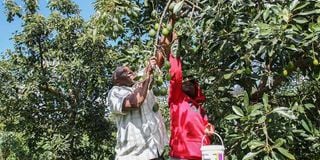EU programme falls short in promotion of export farming

Farmers harvest Hass avocado fruits on a farm. Economic evaluations show an introduction of a unique array of “sustainability” requirements whose compliance costs will be borne by the farmers as implementation gets underway.
The European Commission is adopting intermediate proposals in its international climate policy, outlined in the European Green Deal that provides a road map for a socioecological transition to a low-carbon future and building blocks for a green economic growth strategy to address climate change, energy and biodiversity.
However, the implications of the EU Green Deal (EU GD) for Africa are multifaceted. Most prominently, the stringent policies outlined in the Farm to Fork (F2F) and Chemical Sustainability Strategies will greatly affect global trade in agricultural inputs and outputs, and by extension the economies of African countries that greatly depend on agriculture.
Implementing this EU GD comes will increase costs on overburdened farmers who are buying inputs at an all-time high price precipitated by the Russian-Ukraine war and high inflation rates, which have not only impacted farm productivity and profitability but increased other costs like freight and local logistics.
Economic evaluations show an introduction of a unique array of “sustainability” requirements whose compliance costs will be borne by the farmers as implementation gets underway.
The new additional requirements threaten the livelihoods of many small producers and may significantly reduce the export earnings of East African countries such as Uganda, the second-largest horticulture exporter in East Africa. Horticultural exports from East Africa to the EU are valued at more than $2.3 billion with smallholder farmers contributing up to 70 per cent of the export volumes.
The climate change/ green funds from the West to developing countries have not increased significantly from the $6.7 billion set aside annually since 2018, and while a significant amount has gone to mitigation, Africa needs funds for “adaptation”, hence these developing countries are yet to adopt adaptation and resilience approaches to climate change.
This may lead to farmers significantly pulling out from export-oriented horticultural production if not adequately and affordably financed or subsidised. The drop in horticultural exports, in essence, household incomes, could impact food security.
Weak institutional governance
The study says in most East African countries regulators are yet to embrace the EU GD fully. There is a need to strengthen the already weak institutional governance and regulatory frameworks to support smallholder farmers.
With the major impact that the EU GD is likely to pose to these economies, there is an urgent need for quick interventions to encourage consultations on these regulations.
Technological innovations based on the Total Factor Productivity (TFP), and a mix of novel and technically effective technologies, would address innovation in the agricultural sector. This will require negotiations for the gradual adoption of policies to address trade-offs and maximize synergies.
The EAC governments’ support through subsidies and trade negotiations with the EU bloc would be imperative for EA farmers’ access to the EU market.
The EU GD, in its current form, falls short in support of progressive and sustainable export-oriented farming for most East African smallholder farmers.
Mr Muchiri is the CEO of Eastern Africa Farmers Federation (EAFF). [email protected].




